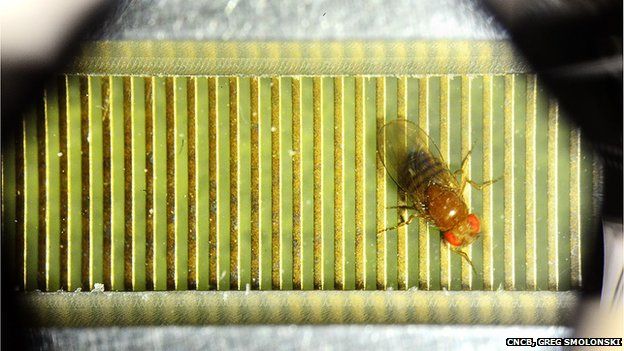Flies pause while 200 neurons help with tough decisions
- Published

Just like us, fruit flies dwell on difficult decisions, according to a study published in the journal Science.
They spend more time choosing between a strong and a weak smell if the difference is small.
The research links this deliberation to a particular gene, FoxP, and the activity of fewer than 200 neurons.
Mutations in FoxP, also associated with cognition and language in humans, made flies' decisions even slower without affecting which choice they made.
Gathering information before committing to a decision is a hallmark of intelligence. If the information is unclear, the choice is trickier and the decision takes more time.
We do it, other primates do it, even rats and mice do it - but now it seems that flies do too.
Confident choices
"This is the clearest evidence yet of a cognitive process running in a very simple brain," said Prof Gero Miesenböck, whose team did the work at the University of Oxford's Centre for Circuits and Behaviour.
"People tended to think of insects as tiny robots that just respond reflexively to signals from the environment. Now we know that's not true."
After training fruit flies to avoid a new smell at a specific intensity, the researchers offered them a choice between that dangerous odour level and a weaker one. The flies did well when the safe option was four or five times weaker, but chose randomly if the difference was only 10%.
Crucially, as the differences became smaller and trickier to distinguish, the flies took more and more time to make a decision, waiting much longer in an intermediate zone between the two odour levels.
This is a pattern that psychologists have studied for many decades. "The same mathematical models that describe human decision-making also capture the flies' behaviour perfectly," Prof Miesenböck told BBC News. "That's remarkable."
It suggests that the fly's brain is gradually accumulating evidence until it has enough to make a choice with confidence.
Next, the researchers looked for mutant strains of fruit fly that showed differences in this decision-making pattern. A mutation in the gene FoxP fits the bill perfectly: these flies were even slower to make up their minds, but they continued to make just as many correct choices.
Leaking information
The team traced the effect of FoxP to about 200 neurons, 0.1% of the fly's total brain-cell count, and all within the "mushroom bodies" - a pair of brain compartments already known to be important for learning. Making other disruptive changes to these same 200 neurons produced a similar effect.
It all points to a circuit of brain cells that support decision-making by amassing relevant information. The genetic changes might effect the accumulation or the storage of that information.
"Before a decision is made, brain circuits collect information like a bucket collects water," said Dr Shamik DasGupta, the study's lead author. "Once the amount of accumulated information has risen to a certain level, the decision is triggered. When FoxP is defective, either the flow of information into the bucket is reduced to a trickle, or the bucket has sprung a leak."
Prof Matthew Cobb from the University of Manchester, who was not involved with the study, says the experiments are impressive and is not surprised they took the Oxford team five years. "The data are incredibly solid," he told the BBC.
Humans have four different genes that are related to FoxP and one of them in particular, FOXP2, has previously been linked with language and cognitive development.
One of the scientists who discovered FOXP2 was Prof Simon Fisher, now working in the Netherlands at the Max Planck Institute for Psycholinguistics. He told BBC News the latest findings were exciting and contribute to a "fascinating picture" of the gene and its history.
Prof Fisher explained that work like this in other species suggested the role of FOXP2 in humans is "built on ancient functions", relating to the wiring of neural circuits and how they change as we learn.
"It turns out that this is a gene that has been around for a really long time in evolutionary history, doing interesting things in the brain," he said.